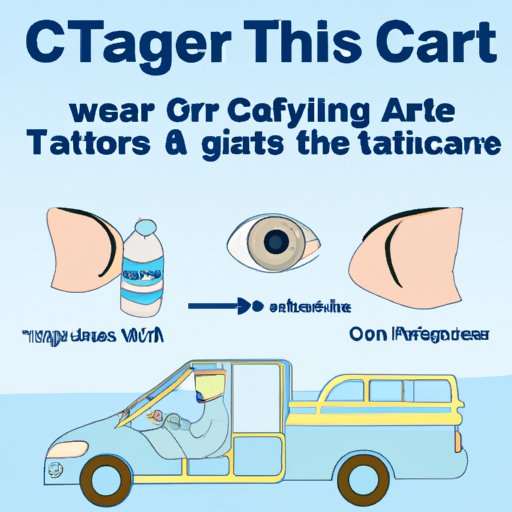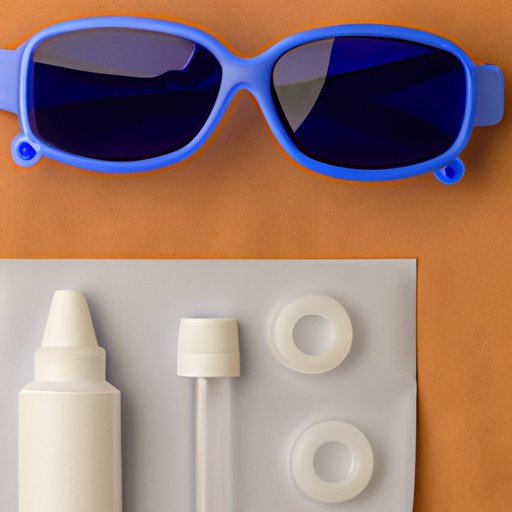Introduction
Cataract surgery is a common procedure used to treat vision loss caused by clouding of the eye’s natural lens. It is a relatively safe and straightforward operation that can restore vision and reduce glare. However, it is important to take extra precautions when travelling after cataract surgery. In this article, we will explore the steps you should take before, during, and after your travels to ensure a safe and enjoyable trip.

Tips for Safely Travelling After Cataract Surgery
Before embarking on your travels, it is important to consult with your eye doctor and get an eye exam. This will help ensure that your eyes are healthy and ready for the journey ahead. Additionally, here are some other tips to keep in mind when travelling after cataract surgery:
- Wear sunglasses with UV protection. Ultraviolet (UV) radiation can be damaging to the eyes, especially after cataract surgery. Make sure to wear sunglasses with UV protection whenever you’re outdoors.
- Bring eye drops with you. Dry eyes can be a common side effect of cataract surgery, so it is important to bring eye drops with you to keep your eyes moist during your travels.
- Wear a hat to protect your eyes from the sun. Wearing a wide-brimmed hat or cap can provide additional protection from the sun’s rays, helping to keep your eyes safe during your travels.
Preparing for a Trip After Cataract Surgery
Once you’ve consulted with your eye doctor and received the go-ahead to travel, it is time to start planning your trip. Here are some tips to keep in mind when preparing for a trip after cataract surgery:
- Choose the right location. Choose a location that is not overly bright or sunny, as this can cause strain on the eyes. Additionally, make sure to do research about the climate and weather at your destination, as this can affect your comfort level.
- Choose the right accommodations. Look for accommodations that are comfortable and have good lighting. This can help make your stay more enjoyable and reduce the strain on your eyes.
- Pack the necessary equipment and supplies. Pack all of the necessary items that you might need during your travels, such as eye drops, sunglasses, hats, and any other equipment that may be recommended by your doctor.

What to Expect When Travelling After Cataract Surgery
It is important to be aware of the possible symptoms that may occur after cataract surgery. Common symptoms include light sensitivity, blurred vision, eye fatigue, and dry eyes. While these symptoms may be uncomfortable, they should subside over time. Here are some tips for managing symptoms while travelling:
- Take breaks throughout the day. Taking frequent breaks throughout the day can help reduce eye strain and give your eyes a chance to rest. If possible, try to avoid staring at screens for long periods of time.
- Avoid activities that may cause strain on the eyes. Activities such as reading and watching TV can cause strain on the eyes, so it is best to avoid them while travelling after cataract surgery.
- Wear sunglasses with UV protection. As mentioned earlier, UV radiation can be damaging to the eyes. Make sure to wear sunglasses with UV protection whenever you’re outdoors.

Exploring New Places After Cataract Surgery
Travelling after cataract surgery can be a rewarding experience. While there may be some limitations, there are still plenty of ways to explore new places. Here are some ideas for enjoying your travels:
- Taking in the sights. Take in the sights of your destination, whether it be a city skyline, mountain range, or beachfront. Enjoy the scenery and take lots of pictures!
- Experiencing different cultures. Immerse yourself in the culture of your destination. Try new foods, listen to local music, and explore the area’s history.
- Trying new foods. Trying new foods is one of the best parts of travelling. Sample the local cuisine and expand your culinary horizons!
How to Protect Your Eyes During Post-Cataract Surgery Travel
In addition to the tips mentioned above, here are some other ways to protect your eyes during post-cataract surgery travel:
- Wear sunglasses with UV protection. As mentioned earlier, UV radiation can be damaging to the eyes. Make sure to wear sunglasses with UV protection whenever you’re outdoors.
- Take frequent breaks from screens. Staring at screens for long periods of time can cause strain on the eyes. Take frequent breaks throughout the day to give your eyes a chance to rest.
- Follow your doctor’s advice. Before travelling, make sure to follow your doctor’s instructions and recommendations for protecting your eyes. This may include wearing sunglasses, avoiding certain activities, and taking breaks throughout the day.
Planning Ahead for Stress-Free Post-Cataract Surgery Travel
The key to a successful and enjoyable post-cataract surgery travel experience is to plan ahead. Here are some tips for planning ahead for a stress-free trip:
- Make a travel plan that works for you. Plan out your itinerary and make sure to factor in rest and relaxation time. This will help ensure that you don’t overdo it and end up feeling exhausted.
- Research the destination. Research your destination and make sure to read up on the weather and climate. This will help you pack the appropriate clothing and prepare for any unexpected events.
- Prepare for emergencies. Make sure to have a plan in place in case of an emergency. Bring along a first aid kit and research the local hospitals and doctors in case you need medical assistance.
Conclusion
Travelling after cataract surgery can be a rewarding and enjoyable experience. By following the tips outlined in this article, you can ensure that your post-cataract surgery travel is safe and stress-free. Remember to consult with your doctor before travelling and make sure to follow their advice. With the right preparation and planning, you can have a successful and enjoyable post-cataract surgery travel experience.
(Note: Is this article not meeting your expectations? Do you have knowledge or insights to share? Unlock new opportunities and expand your reach by joining our authors team. Click Registration to join us and share your expertise with our readers.)
